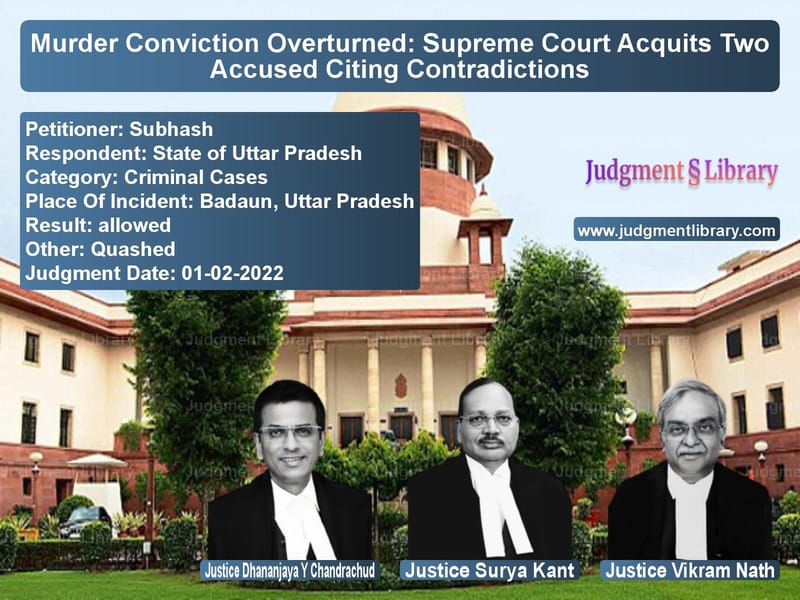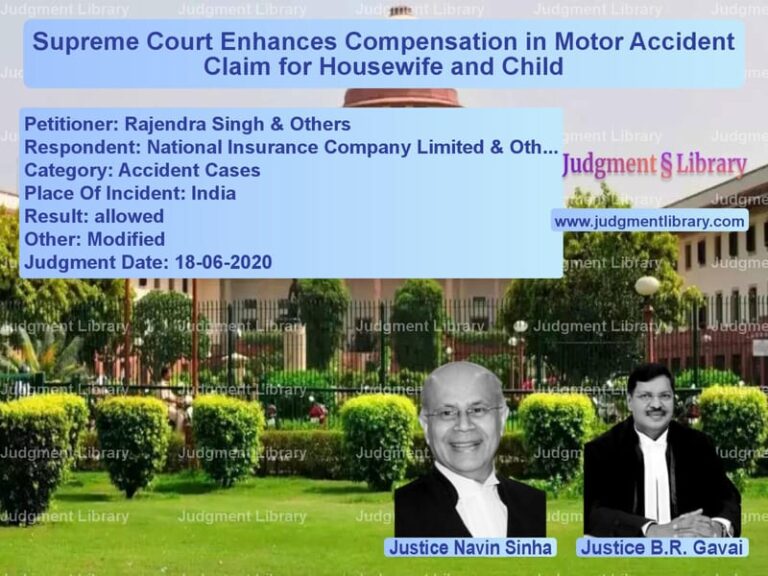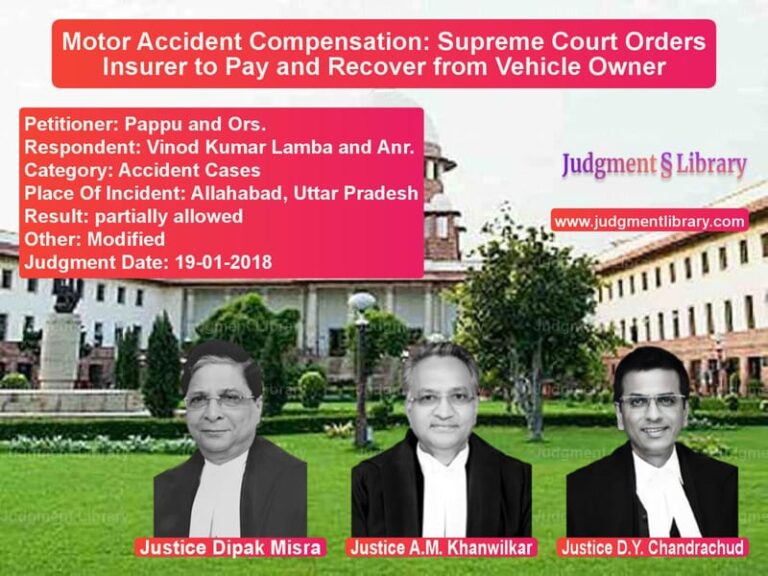Murder Conviction Overturned: Supreme Court Acquits Two Accused Citing Contradictions
The Supreme Court, in Subhash vs. State of Uttar Pradesh, delivered a significant judgment regarding murder convictions under Sections 302 and 149 of the Indian Penal Code (IPC). The case centered on the killing of Surender, with multiple accused facing life imprisonment. The apex court critically analyzed witness testimonies and medical evidence to assess whether the convictions were justified.
Background of the Case
The case originated from an incident in Badaun, Uttar Pradesh, on 16 February 2002. The complainant, PW-1 (Vedram), lodged an FIR at 2:30 PM, stating that his brother Surender was shot and attacked with a knife and axe by the accused. The accused included Rajaram, Rajesh, Subhash, Rampal, Shiv Dayal, and Gyanvati. The prosecution alleged that the motive behind the murder was revenge, as Surender was accused in the murder case of Rajesh’s father.
The trial court convicted all the accused under Sections 148 and 302/149 IPC, sentencing them to life imprisonment. The High Court upheld this conviction. However, two of the accused, Subhash and Gyanvati, appealed to the Supreme Court, arguing that there were serious contradictions in the prosecution’s case.
Arguments by the Parties
Petitioner’s Arguments (Appellants Subhash and Gyanvati)
- PW-1, the main witness, was an accused in the murder of Rajesh’s father. It was improbable that he would be spared when a large group attacked Surender.
- There were significant inconsistencies between PW-1’s FIR statement, his deposition under Section 161 CrPC, and his testimony in court.
- PW-2, a chance witness, lacked reliable knowledge of the incident and provided contradictory statements.
- The postmortem report revealed only one gunshot wound, contrary to the prosecution’s claim that four accused fired at the deceased.
- The medical report recorded only one injury on the neck, whereas the prosecution alleged that both Shiv Dayal (armed with an axe) and Gyanvati (armed with a knife) struck Surender’s neck.
- The prosecution failed to examine Chetram, the father of the deceased, who was allegedly an eyewitness.
Respondent’s Arguments (State of Uttar Pradesh)
- The contradictions raised by the defense were minor and did not affect the credibility of the prosecution’s case.
- PW-1’s testimony was consistent with the FIR, with minor variations that were natural over time.
- The medical report confirmed close-range firing, which matched PW-1’s statement that the accused fired from five to six steps away.
- Failure to recover weapons was not a crucial factor in sustaining the conviction.
- Gender should not be a basis for doubting the participation of a female accused in a violent crime.
Supreme Court’s Key Observations
1. Contradictions in Witness Testimonies
The Supreme Court critically examined the testimonies of PW-1 and PW-2, noting material contradictions:
“There are material improvements in PW-1’s deposition over the FIR and his previous statements. Initially, he stated that all four accused fired at the deceased, but later claimed that only two fired while the others shot in the air.”
Similarly, the court found PW-2 unreliable as he could not specify the sequence of events or the nature of the injuries.
2. Discrepancy in Medical Evidence
The Supreme Court found that the medical report contradicted the prosecution’s claims:
- The postmortem recorded only one gunshot wound, whereas the prosecution claimed multiple accused fired at the deceased.
- Only one neck injury was found, conflicting with allegations that two accused attacked the neck simultaneously.
“The prosecution’s theory that multiple accused used firearms and inflicted multiple wounds is not supported by medical evidence.”
3. Failure to Examine a Key Witness
The court noted that the prosecution did not produce Chetram, the father of the deceased, as a witness. Since he was allegedly present at the scene, his testimony could have provided crucial clarity.
“The non-examination of Chetram assumes significance in the present case and raises doubt about the prosecution’s case.”
4. Unreliable Evidence Against the Accused
The Supreme Court ruled that the prosecution failed to establish beyond reasonable doubt that Subhash and Gyanvati were guilty. The contradictions in witness statements, inconsistencies with medical reports, and lack of corroborative evidence created reasonable doubt.
Final Judgment
Based on these findings, the Supreme Court ruled:
- The conviction of Subhash (A-3) and Gyanvati (A-6) was overturned.
- The judgment of the High Court dated 11 January 2019 was set aside.
- Both accused were acquitted and ordered to be released unless required in other cases.
Impact of the Judgment
This ruling is significant for multiple reasons:
- It underscores the importance of consistency in witness testimonies for sustaining convictions.
- It highlights the need for medical evidence to corroborate eyewitness accounts.
- It emphasizes that minor contradictions can be overlooked, but fundamental inconsistencies that affect the core of the prosecution’s case cannot be ignored.
- It reaffirms that High Courts must thoroughly evaluate evidence before upholding convictions, especially in cases involving life imprisonment.
The Supreme Court’s judgment sets a precedent for how courts should handle murder cases where contradictions in prosecution evidence create reasonable doubt, ensuring that wrongful convictions do not occur due to inconsistencies in witness statements.
Petitioner Name: Subhash.Respondent Name: State of Uttar Pradesh.Judgment By: Justice Dhananjaya Y Chandrachud, Justice Surya Kant, Justice Vikram Nath.Place Of Incident: Badaun, Uttar Pradesh.Judgment Date: 01-02-2022.
Don’t miss out on the full details! Download the complete judgment in PDF format below and gain valuable insights instantly!
Download Judgment: subhash-vs-state-of-uttar-prade-supreme-court-of-india-judgment-dated-01-02-2022.pdf
Directly Download Judgment: Directly download this Judgment
See all petitions in Murder Cases
See all petitions in Attempt to Murder Cases
See all petitions in Judgment by Dhananjaya Y Chandrachud
See all petitions in Judgment by Surya Kant
See all petitions in Judgment by Vikram Nath
See all petitions in allowed
See all petitions in Quashed
See all petitions in supreme court of India judgments February 2022
See all petitions in 2022 judgments
See all posts in Criminal Cases Category
See all allowed petitions in Criminal Cases Category
See all Dismissed petitions in Criminal Cases Category
See all partially allowed petitions in Criminal Cases Category







